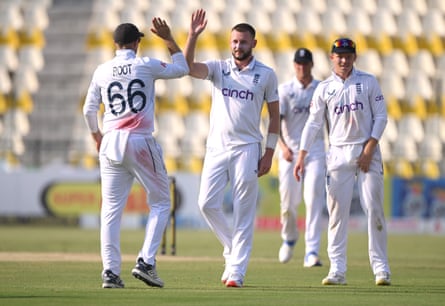For weeks Pakistan teased England with talk of green pitches and seamer-friendly conditions, and then in the final hours before the opening game they peeled off the covers, shaved off anything betraying any evidence of chlorophyll, gave the heavy roller a final, deathly spin and, once the coin had fallen in their favour, told the tourists to do their best.
What followed was a bowling performance that, at least until they took three wickets for 95 in the final session, was as flat as the surface the bowlers were forced to toil on, and an opportunity for a Pakistan lineup that has struggled for form.
Pakistan finished on 328 for four after centuries from Shan Masood and Abdullah Shafique carried them to a position of dominance – though given they started their last series by scoring 448 for six declared across the best part of two days against Bangladesh and still managed to lose the game, it is still not one that feels particularly secure.
It is hard to see how the presence of Jimmy Anderson, England’s fast bowling coach, would have improved matters but this was certainly not a day that made his decision to start the series on a Scottish golf course appear any wiser.
For all their toil the seamers all had their moments: Chris Woakes’s best spell came late in the day, under floodlights and with the second new ball, during which he trapped Babar Azam lbw, Brydon Carse bowled with pace and as much venom as it was possible to extract from the surface, and Gus Atkinson took two wickets.
The first of those gave England early hope, Pakistan’s opening partnership broken for what was both a terrible score and also their best for nine months.
When the ball flicked Saim Ayub’s glove on its way down the leg side and into Jamie Smith’s gloves he had scored four and his team eight, which somehow ranks as the best partnership so far between him and Shafique. The openers are averaging 3.28 after seven attempts together. In the history of Test cricket no pair have gone so long without reaching double figures.
If that was sweet, all that followed for England was sweat. The breakthrough brought Masood to the crease, with his struggling side teetering on the edge of a fresh crisis.
His position as captain and in the team has become the subject of debate in recent months, and it had been more than four years and 26 innings since he last scored a Test ton, in which time his average was a miserable 20.69. But it swiftly transpired there were no demons in this pitch, and none in his head either.

From the start, and a first-ball hit down the ground for a couple, Masood’s timing was sweet and his movements smooth, and he was particularly dismissive when England attempted some short stuff after lunch. But for a brief scare when he was given out lbw on 16 – a decision reversed on review because the ball pitched wide of leg stump – he gave his opponents nothing but punishment.
Shafique at the other end was less fluent, more safety-focused, as might be expected of a player who had been dismissed for fewer than five runs in seven of his previous 10 Test innings. Not that it was without ambition, and he scored 10 fours and two sixes – immaculately timed given that one, lifted down the ground off the spin of Shoaib Bashir, brought up his 50 and the other, lifted down the ground off the spin of Jack Leach, brought up an exuberantly received hundred – on his way to an 184-ball 102.
after newsletter promotion
Shafique’s one misjudgment came at the start of the 17th over, when he called for a wildly ill-conceived single off Carse and presented Ollie Pope with a wonderful chance to run him out, but the England captain did not appreciate quite how much time he had. From close range but side-on, he attempted an underarm throw at the stumps that narrowly missed, with the batter still distant. After that Shafique retreated into his shell, and a run of 17 successive dot balls, which he eventually busted out of by hitting 15 off one Bashir over.
The next time England got anywhere close to a wicket was precisely 26 overs later. Masood was on 115, and even that was close only in their imaginations, with a review for a possible catch that nobody at any stage seemed very excited about duly showing the ball hitting only a pad before looping to slip (Pope’s 11th review as captain thus proving as poor as the previous 10, an extraordinary run of failures).
Both batters eventually fell in the hour after tea, Shafique pushing straight to Pope at cover and Masood, having scored 151 off 177, chipping a return catch to Leach.
Babar and Saud Shakeel then very equally shared a stand of 61 for the fourth wicket before the former fell for 30 to bring Naseem Shah out as nightwatch.
It is worth noting that England have never had a swifter turnaround from their last Test of the summer to their first of the winter.
Sri Lanka wrapped up victory at the Oval on 9 September; it might in the end not have been the horror show that had been threatened but this often lifeless display came, perhaps appropriately, 28 days later.

Comments (…)
Sign in or create your Guardian account to join the discussion